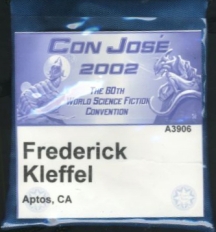 |
|
Con Jose ID Badge, 8/28/2002. No line for the letter K. And before you ask, yes I was expecting maybe The Trial. |
|
|
|
My First WorldCon
Over the Hills and Far Away
The Agony Column for September 5, 2002
Covering WorldCon Day 1 8/28/02
Commentary by Rick Kleffel
 |
|
Con Jose ID Badge, 8/28/2002. No line for the letter K. And before you ask, yes I was expecting maybe The Trial. |
Since I live just slightly south of Santa Cruz, California, when I was told last year by a friend that the World Science Fiction Convention would be held in San Jose this year, I decided to attend. In fact, I decided to attend to the tune of paying about $200 in advance, a huge investment for someone at my delicate earning level. Once I paid for my membership -- attending all four days (though it turned out to be five), I pretty much forgot about it, though I looked with interest at the notes I was periodically sent by an earnest and efficient WorldCon committee.
As the date began to approach more closely, I mentioned that I would be attending a WorldCon to a good friend, Dana. Dana and I have collaborated on music for about 10 years; I program sequencers and play keyboards, while Dana plays guitars and keyboards and sequencers. He was electrified. "I used to know Ted White! He had a radio show in Washington DC!" he exclaimed.
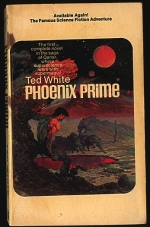 |
|
I saw the advertisement for this book in the back of an HP Lovecraft paperback I've shown you before. They were both to be found in a seedy liquor store that featured Mickey Spillane paperbacks with really racey covers. |
[I was instantly thrown back in time. I could envision the back page of a Lancer paperback book. It advertised 'Phoenix Prime' by Ted White, and it seemed like a book that was far too adult for the pre-adolescent reading the advert. I never bought it from the liquote store where I saw it.]
"You know Rick, we have to play music at that WorldCon. We have to!"
"O.K. I'll see what I can find out about it."
It took me a few emails to get set up, but soon enough I'd met online the wonderful Elizabeth Klein-Lebbink. We posted some samples of our ambient performances and she and her co-workers indicated that they were willing to give us a shot.
In the meantime, I was also gearing up for the reading and writing aspect of this convention and for another literature-oriented venture as well. I was hoping to work with the local NPR affiliate, KUSP. After many years a venerated book interviewer was retiring and they were looking for book-oriented programming. I signed up to interview visiting authors. The producers were just a bit hesitant about my genre fiction orientation. This wasn't the type of content they had previously used; most of the authors were writers of non-fiction or mainstream literary works. I suggested that during WorldCon I might be able to find a genre author willing to do a radio interview, and my producer indicated that KUSP was willing to give it a try.
This rather complex negotiation was wrapping up only a month before WorldCon. I'm not a juggler, but I was beginning to feel like one. When I received my Hugo ballot, I considered voting. I'd read four of the five novel nominees, but not much else. In the end, I decided it would not be appropriate. In my own mind, I'm not exactly a science fiction fan.
In my attempts to bring some other voices to The Agony Column, readers have (I hope) enjoyed the author interviews; the stats seem to suggest that this is true. I decided to contact Alastair Reynolds, with whom I had corresponded a couple of years ago, just after 'Revelation Space' was released in the UK. He most graciously agreed to be interviewed via email for The Agony Column, but mentioned in his email that he would be at the convention; perhaps I could interview him then. I proposed to KUSP that I might be able to interview him for the show and received the OK from the show's producer. Now all I had to do was to see if Mr. Reynolds could fit it into his schedule and if that could be matched with the studio's production schedule. Thus was born a Labor Day weekend that truly lived up to its name. It was a labor of love, of course.
I'd previous been to one day of the World Fantasy Convention when it had been held in Monterey. Basically, it had been a book-buying expedition, augmented by a couple of readings. WorldCon was looking to me a bit like job fair and a bit like a college class. On day one, Thursday, August 28, I had to take my teenager up to Scotts Valley at 12:30, so I couldn't actually get to the convention until around 2:00 PM. I must say that the directions the pamphlet gave for driving to the San Jose Convention center were peerless -- and that's important. Nothing can ruin an event like a traffic or parking nightmare, and they're both readily available in San Jose. A short hop up the 280 freeway, right on a rather obscure off ramp and you're dumped on top of the Convention Center. The easiest path there leads you right past a convenient low-cost (free on the weekends) parking lot. From there, it was an easy walk to the Con.
It was also boiling hot, at least compared to my part of Santa Cruz. I was practically dripping by the time I arrived. Fortunately for me, the line I was supposed to get in was entirely empty; two letters over from my last name, and I would have had to queue up behind 20 or so fellow attendees. There were no Pocket Programs yet available; word was they were to arrive at 3:00 PM.
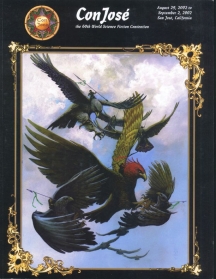 |
|
Con Jose WOrldCon booklet. Mine has the signature of Charlie Stross. In about two years, SF fans will be falling over themselves to read his books. |
In an interesting concession to These Hard Times, there was NOTHING given to the participants beyond the program. At the World Fantasy Convention, they handed youa plastic bag, and then proceeded to fill it up with all manner of books and promotional materials. Here you got the program and that was it thankyouverymuch. Just a point of interest, mind you. These Tough Times.
I sauntered over to an easel that held a list of the current panels. Standing in front of the easel was China Mieville, one of the true 'rock stars' of Agony Column readers. I introduced myself, and expressed my admiration for the rant on fantasy available from his website. He quickly corrected any misapprehension I might have about the website -- it was designed and supported by the publisher. I wished him the best, then moved on.
 |
|
A panel on 2001 the movie versus 2001 the year was the first item I chose to attend. |
I turned my attention to the programs on offer and easily found the panel I was most interested in -- '2001: The Year vs. Stanley Kubrick'. I was one of those kids who had collected the issues of Life and Look magazines that previewed the movie and cut out all the pictures to collect them in a scrapbook. I'd read both the story and the book by the time I saw the movie at the Cinerama Dome. I'd seen numerous revivals and made my kids watch it with me on cable. It was a high point of my life as a young science fiction fan. The panel members also piqued my interest -- Alastair Reynolds was on the panel and I hoped to introduce myself. Also present were Dr. Takayuki Tatsumi, a noted Japanese writer on the movie itself, and Louise Kleba, who worked at NASA. Tom Galloway and Richard F. Dutcher rounded out the group.
I took a quick peek at the Art Gallery, and was greatly heartened. I had in my brain a picture of the much more confined reaches of the gallery I'd seen at the World Fantasy Convention. This was about 8 times bigger, with a huge ceiling. Ms. Klein-Lebbink showed me around and I fond a place we could tentatively set up. But frankly, the place was so huge, I was rather lost. We could have set up an all-terrain vehicle mud race in the Exhibit Hall.
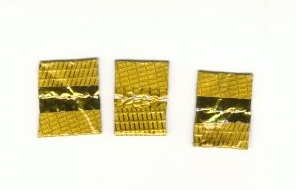 |
|
After the panel on 2001 I talked to Louise Kleba. She gave me pieces of foil that had been in space, on a shuttle mission in 1993. How cool is that? Very cool. |
I popped a couple of corridors over to the panel-halls, and found the 2001 room. The panel was fascinating, and the commentators threw a lot of interesting thoughts about. Stanley Kubrick's cold vision was contrasted with Arthur C. Clarke's avuncular style. Hal's place as the only character to show emotion and the mind-bending trip finale got the panel's and the audience's attention. Louise Kleba's insights into NASA were fascinating. Dr. Tatsumi's comments on the Japanese response to '2001' were also illuminating. I was impressed by the demeanor of the whole proceeding. The questions were ordered and fairly intelligent, as were the answers. It was not just a geek-a-thon. After the seminar, I talked to Mr. Reynolds, found when his schedule was tentatively clear, then headed over to the opening ceremonies.
In between panels I bathed in the batches of books in the dealer's room. First editions of Dune, Lovecraft, Heinlein and Arthur C. Clarke's '2001: A Space Odyssey'. Oh to have my former income level now! Alas, I'm on a financial diet and I forced myself to walk away with only the Alastair Reynold's novella from Golden Gryphon, 'Turquoise Days'.
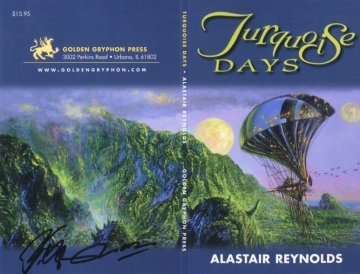 |
|
Cover art for Golden Gryphon's first novella, Alastair Reynolds' 'Turquoise Days'. It's set in the 'Revelation Space' universe, but not necessarily connected. Golden Gryphon was giving away these card-printed covers. Bob Eggleton, the artist was standing there when I bought my copy, so I had him sign the artwork. |
Opening Ceremonies were held in the Fairmont Hotel Imperial Ballroom, a huge hall filled with rows of folding chairs. I decided to go in my guise as a reporter, and to see what the more "fannish" portions of the convention would be like. I sat down in the brightly lit room, and watched as several groups of people dressed in strangely formal-looking white terrycloth robes slowly moved from the front to the back of the room. Were those rubber ducks they were holding in veneration? Was that a loufa? As a choir assembled and started singing a mass in Rubber Duckese, the picture sharpened to crystal clarity. The lyrics were clever, the singing was actually quite excellent. However, I could see this as the moment the mainstream media would associate with the Convention, not the erudite discussion that had preceded it.
But it was nice, low-key, well-executed fun. Speeches by Con presidents past and present followed, with a brief message from Tad Williams, Vernor Vinge, longtime fans Bjo and John Trimble and David Cherry. Certainly a standout feature for me was the introduction of Ferdinand Feghoot. I hadn't known that there would be an Imaginary Guest of Honor. Richard Lupoff gave the audience a most exceptional shaggy dog story. Fortunately, nobody went on too long; the event concluded in a timely manner, and we all went sprinting to our next panel.
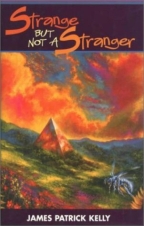 |
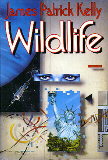 |
|
James Patrick Kelly's new short story collection, 'Strange but Not a Stranger', from Golden Gryphon. |
James Patrick Kelly's novel 'Wildlife', which I intend to seek out and read, in the fullness of time. |
My target was 'The Joy of the Short Story'. The panel consisted of Shane Tourellotte, James Patrick Kelly, David Levine, David Marusek, Eileen Gunn and Lucius Shepard. This turned out to be a wonderful world of advice on short story writing. Sure, sometimes the audience got a bit hung up on word count questions. But Lucius Shepard managed to be inspiring, which is no small feat. Shane Tourellotte, a hard-SF writer whose work I have never read was crisp and clear. David Levine and Eileen Gunn managed to convey the more chaotic aspects involved in writing and selling stories. James Patrick Kelly was a strong speaker with strong points of view and about a bazillion published short stories. He has a new collection out from one of the convention star publishers, Golden Gryphon. I was intrigued by what he had to say, and intend to follow up and read one of his novels. I rushed out of the short story panel and found the dealer's room closed. I was saved from myself for another day.
It was by now 7.00 PM, and I had an hour drive home. Nothing on the agenda exerted a powerful enough pull to make me stay; I'm an early riser and 7.00 to me is equivalent to midnight for the average human. The drive home was happily uneventful. Would that this were always the case!
Thanks,
Rick Kleffel